German army MARS II/MLRS-E Multiple Launch Rocket System supplied to Ukraine by Germany © KMW


“Don’t bow down to bullies,” is the message of German MEP Michael Gahler to his fellow EU lawmakers. Gahler is the spokesperson on Foreign Affairs for his political group, the centrist European People’s Party (EPP). He is being targeted by both China and Russia, but doesn’t seem too worried about either of them. Being seen as a potential enemy by a country, entity or group that is not friendly towards the European majority can be seen as a sign of bravely standing up to bullies, after all. “I am glad that NATO is finally returning to reality with a new strategic concept,” he said about Europe’s reaction to attempts by tyrannical regimes to tell them what to do, “and that Russia is assessed as the most urgent threat to Europe.” I don’t imagine that many in Western Europe (let alone within the EU itself) would disagree with that assessment.
In a recent speech in the European Parliament, Gahler made clear his position: “In this systemic conflict between our peace-loving democracies and a belligerent dictatorship, we have seen in recent weeks a renewed escalation on the part of the deeply fascist aggressor: mobilization, especially in areas with national minorities, and a farce of vote to give the impression that here a Ukrainian population is just waiting to be brought home to the Reich,” Gahler sees Russian subterfuge, presumably designed to mislead whatever allies he has. “That’s when the Potemkin façade of pseudo-legitimacy collapses for all to see. Now it must be a matter of making Ukraine winter-proof – economically, humanitarianly, socially and, above all, in the stabilization of arms deliveries.”

Gahler is unhappy with being compelled to provide arms but feels there is no choice. “Yes, unfortunately it is required. I would like to see the American Lend-Lease Act in Europe, at least in some Member States. (The original version, which ran from 1941 to 1945, was aimed at supplying food, oil and materiel to America’s allies on the basis that it would help them to defend the United States and that the equipment, including ships and aeroplanes supplied would be returned when the war ended). In today’s case, this would speed up arms deliveries because it makes individual permits superfluous.”
Gahler has made clear his firm believe that Ukraine’s place is inside the European Union, no matter what Putin and his cronies believe. “Ukraine should work on its European integration and make itself so attractive that the EU cannot resist giving it membership,” Gahler said in an interview with Promote Ukraine. He also told the media: “We are not going to make concessions, and I assure you, Germany will not be a country that will make concessions to Russia.” Very few countries in Europe would choose to make concessions to Russia and certainly not too many of those. Hungary has expressed some support for Putin, but whether that is sympathy for a determined dictator or fear of not showing support is unclear. Putin is said to be an admirer of the Tsars of old, but things didn’t turn out too well for them in the end. They had a habit when engaging in conflict of painting themselves into a corner from which elegant escape was impossible. That seems to be what is happening to Putin in Ukraine.

Take the example of Ivan the Terrible, as he’s known in the West. Even that popular name is a mistranslation, with “the Terrible” being written as “Грозный” – “Grozny” – which doesn’t mean wicked or evil. It takes the more original English meaning of “Terrible” as “inspiring terror” or “formidable”. It can also mean: “courageous, magnificent, keeping enemies in fear and people in obedience”, which is more in keeping with the rôle of a leader. Certainly, he seems to have been somewhat unbalanced at times.

Ivan was born in August 1530 and ascended the throne as Grand Prince of Moscow when he was just three years old, following the death of his father, Vasili III, the Rurikid ruler of the Grand Duchy of Moscow. Vasili had contracted blood poisoning after an abscess developed on his leg. He had taken over the leading position from Ivan III Vasilyevich, known to history as Ivan the Great, leading to Vasili III (who came after “the Great” and before “the Terrible”), sometimes being referred to jokingly as “Ivan the Barely Adequate” or “Ivan the Ordinary”, which is a bit unfair. Presumably, when Putin idolises ancient Tsars and dreams of being likened to them, it’s not Vasili III he’s thinking of. In fact, it’s probably Ivan the Great, who reigned from 1462 and who greatly increased the amount of territory under Moscow’s rule through war. He ascended the throne after serving as regent for several years because his father, Vasily II, was blind. Once in charge, Ivan the Great began wars of conquest against his dynastic relatives and rivals.
He also renovated the Kremlin in Moscow (he must have made a good job of it because it is a truly magnificent building, as all the world knows), introduced new laws and in 1480 he defeated the Great Horde, restoring Russia’s independence after 240 years, following the fall of Kiev to the Mongols in 1240. These were dangerous times, with rival leaders and even rival capitals. Perhaps it’s that sort of “wild west” type of existence (or perhaps more a “knights in shining armour” style that Putin favours, if only as long as he emerges the brilliant victor.
| IVAN THE TERRIBLE, MEET VLAD THE GREEDY
Russia is, of course, a vast country: 17,075,4002 kilometres overall, with a population of almost 150-million people. Most of its citizens – more than 80% – are ethnically Russian, but there are a great number of ethnic minorities, too, such as Avars, Bashkirs, Buryats, Chechens, Chuvash, Germans, Jewish, Komi, Mari, Mordovs, Tartars, Udmurts and Yakuts. It is also home to a lot of people from the former Soviet republics, including not only Ukrainians but also Belorussians, Kazakhs and others. The country stretches from the Arctic Ocean in the north to the Black Sea in the south and from the Baltic in the West to the Bering Strait in the east. That’s a pretty vast country by anyone’s reckoning, which poses the question: why on Earth does Putin want more? What is so special about Ukraine, for example, that he wants to add it to his personal fiefdom? The country already has more land than any single entity could need, want or even govern effectively, with more oblasts than you can see from any point apart from outer space. Ukraine does have vast lands for grain production and is rich in coal (if anyone still wants it) plus extensive oil and gas reserves. They’re dwarfed by the massive reserves of Russia, of course. It also had a population of very nearly 52-million in 1991; I expect the figure is higher now.
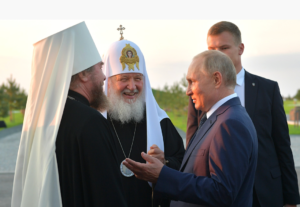
It’s possible, based on previous behaviour, that Putin simply thinks that he should be in charge of everything, everywhere. Perhaps he does. We can, perhaps, put that down to simple greed. Or megalomania, perhaps. Not satisfied with being the ringmaster of his personal circus, he also wants to be the chap riding every elephant, forcing each lion and tiger to cower and then performing on the tightrope and the trapeze, perhaps simultaneously. As it is, ringmaster or simply a bully, Purin seems to be emulating the acts of Ivan the Great, who vastly expanded the territory ruled by Moscow. He also brought the various territories of the Rurikid princes under Moscow’s control, leaving the princes without titles or the right to leave their lands to their descendants. He went to war with Novgorod, too, and after defeating its forces twice in battle, the Novgorodians were obliged to sue for peace and to recognise Ivan as supreme ruler in 1478. When Putin talks of his admiration for the Tsars of old, could it be Ivan the Great he means? Part of the problem then involved religion: Poland, after all, was Roman Catholic, not Orthodox, like Russia, and one of Putin’s most earnest supporters is Patriarch Kirill, the head of the Russian Orthodox Church, who has been quoted as saying: “Russia has never attacked anyone.” His knowledge of history would seem to be somewhat deficient and the many Ukrainians who have seen their relatives killed and their homes, hospitals and schools destroyed must be feeling rather angry about a man of the church lying so blatantly. Pope Frances has also criticised Kirill, saying that he: “cannot transform himself into Putin’s altar boy.” Kirill has said that Russia was forced into military action because the West had forced Ukraine to accept such events as Gay Pride marches, which he considers to be insulting to God.
| HISTORY TRIES TO REPEAT ITSELF

Ukraine may be one of Gahler’s main concerns but it’s not the only one. He is also worried about the possible break-up of Bosnia and moves by the Republika Srpska (RS) towards secession. The 26-year-old Dayton Peace Accords, brokered by the United States, were supposed to end the ethnic wars, but EU Foreign Policy chief Josep Borrell has warned that separatist rhetoric is on the increase, fuelled by continuing ethnic divisions that threaten to put a match to the tinderbox yet again. It is an issue of great concern to Michael Gahler. He urged the EU to act against the secessionists of the RS before, as he put it in the chamber, the “little green men of Russia turn up” to capitalise on the disintegration of Bosnia. It’s something they’re very good at. “The recent concrete steps towards the secession of the Republika Srpska undertaken by the nationalist leadership under Milorad Dodik should ring all alarm bells,” he warned his fellow MEPs. Dodik, a member of the Bosnian-Serb presidency, has said that the Serb-dominated Republika Srpska entity would adopt laws and amendments annulling all the previous laws imposed by the EU’s High Representative in the country and also withdraw its consent on all the reforms already agreed, such as the reform of the army, the reform of the fiscal council, the Indirect Taxation Authority. state police, intelligence agency and other bodies, transferring their powers back to whatever authority previously held them.
Gahler has strongly urged the Office of the High Representative (OHR), in charge of overseeing the implementation of the civilian aspect of the Dayton Peace Agreement, as well as the EU, to issue a strong statement condemning the vote and declaring it illegal. Gahler warned that in the event of Republika Srpska’s secession would receive the active support of Putin. “You know what happens if we allow Dodik to declare independence?” he said. “The next day he will be recognised by Putin who takes revenge for Kosovo and the ‘green men’ are probably on standby somewhere, perhaps in Nis (Serbia) in the Russian Information Centre. We cannot allow that to happen; let us react properly and in time.” But the rest of the EU seems not very keen on discussing the issue. Gahler fears that the affair could destabilise the entire region unless the EU acts quickly. Nothing would please the bloodthirsty Putin more than another war in which he could involve himself and kill a few more people who may be sympathetic to the West.

The fact is that Ukrainian troops are now hitting back at Russian forces using weapons captured from them. In October, they were seen firing a captured Russian 152.4 mm howitzer Msta-B near to the city of Kupyansk. There have been other examples, too. Gahler, together with fellow MEPs Viola von Cramon-Taubadel (Alliance 90-The Greens)and Nicola Beer (Free Democratic Party), is trying to overcome Western scepticism over the possibility that Ukraine could win this war. As reported in Euractiv: “Russia has suffered losses. It lost battles to capture Kyiv, Kharkiv, Mykolaiv and Chernihiv; withdrew forces from Northern Ukraine; ceded control over the North-Western Black Sea; and scrambled to save some of its troops from Izyum-Kupiansk.
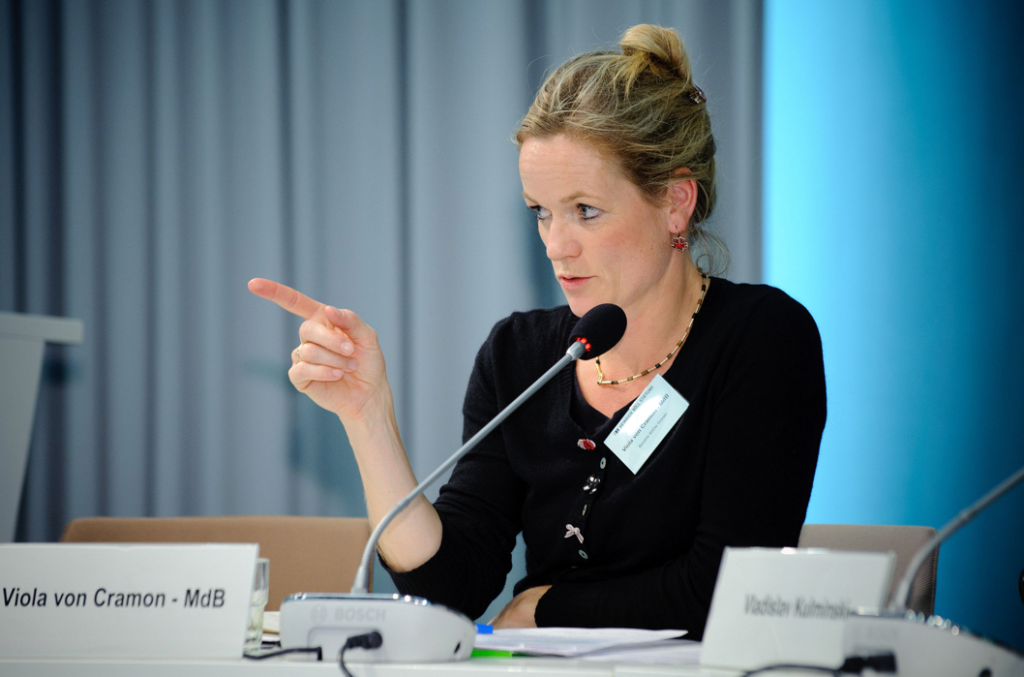
Putin’s regime insists those moves were ‘gestures of goodwill’. However, in reality Russia withdrew troops from those battles when persisting would only mean more losses.” And, of course, Putin’s claim ignores the fact that he has no good will at all, for anyone. Putin, for instance, would never agree with the 19th century American journalist and diplomat John L. O’Sullivan, who wrote in 1837: “Understood as a central consolidated power, managing and directing the various general interests of the society, all government is evil, and the parent of evil…The best government is that which governs least.” Putin, it would seem, wants to govern the whole world. Gahler is convinced he can be defeated. As Euractiv put it in an editorial: “Swiftly and diplomatically ending this war would have been wonderful, but Moscow doesn’t have words of concession or compromise in its vocabulary.”
| CRIME AND PUNISHMENT?
Gahler is also concerned about recent developments in the Western Balkans. During a recent debate on a committee report, he told his fellow MEPs: “that the document calls on Western Balkan governments to step up efforts to implement the necessary reforms, noting that ties between organized crime, politics, and business had existed before the break-up of the former Yugoslavia and continue to exist.” The problem with that sort of institutionalised criminality is that it spreads, and continues to spread unless it’s tackled, as Gahler pointed out. “Therefore, in the report, we call for opening former Yugoslav archives, notably, those of the former Yugoslav secret service (UDBA) and the military intelligence agency (KOS),” he said.

The report calls for prompt, even urgent action on the part of the EU. “Organised crime and corruption,” it argues, “first and foremost hurt the citizens of the Western Balkan countries, as they undermine their right to safety and social cohesion as well as their trust in the democratic system, create obstacles to democratic reforms and hamper the accession process, while also having potential and actual negative impacts on the security and stability of EU Member States.” The report also points out that urgent reform is what the people of the region want and deserve, together with aspirations for EU membership. “Depriving countries of the Western Balkans of a European perspective is worsening the situation as regards organised crime,” it reads, adding that: “it can be improved by fostering the EU integration process and cooperation with the Member States; stresses that fighting organised crime and advancing EU integration are mutually reinforcing processes, hence the need to accelerate the EU integration process.” But, of course, these things take time.
Strangely, Gahler even thinks that the COVID pandemic may have helped the region in its bid to join the EU. Just before the EU-Western Balkans summit in 2020, Gahler issued a statement. He said, “Do not lose sight of the geopolitical consequences of the COVID-19 pandemic. The Western Balkans must not fall into the Russian disinformation trap. The region has a better future with the EU”.
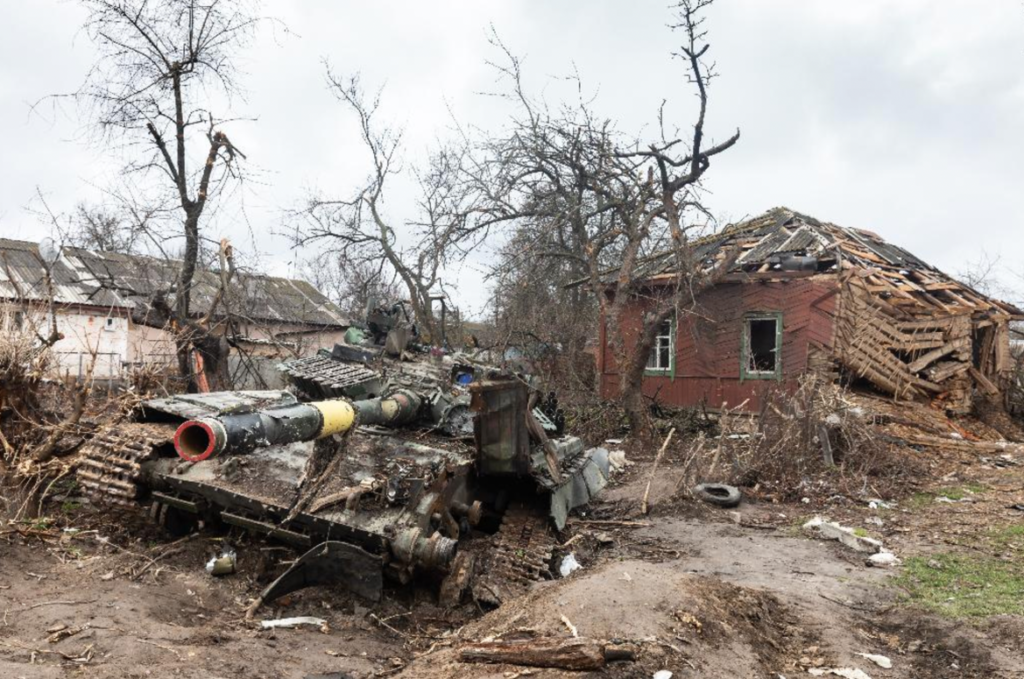
Warning countries not to listen to the honeyed words of Putin has become a regular refrain. “Europeans must turn this crisis into an opportunity and mitigate the impact of the pandemic together”, Gahler said. The EU set aside €3.3 billion to help fight COVID-19 in the Western Balkans. Of course, every country has its ultra-nationalists who believe their homeland is so superior to everyone else’s that they should be in charge everywhere. There are a depressingly large number of British people who still think that way, I’m afraid, as if the days of empire never ended. Some British newspapers seem to share that silliness, trumpeting British superiority for no sound reason. It leads to conflict, of course, and in Russia’s case, it’s a belief that Putin likes to encourage because it disrupts things. Putin, presumably, believes it’s Russia’s destiny to recover the one sixth of the world’s land surface it ruled from 1721 until 1917, when it all came to an end with the abdication of Nicholas II.
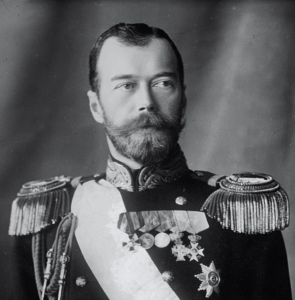
It’s worth looking at how that vast empire came about. In the 17th century, the Russian nobility started looking for a new bloodline for its monarchy and chose Michael Romanov, who came of a noble family and was elected Tsar in 1613. His son, Alexis, came to the throne in 1645, but was very much under the influence of others, including the then Patriarch, Nikon, rather as Putin seems to be in the sway of Kirill. Michael’s other favourite, Boris Ivanovich Morozov, became unpopular with the people, causing an uprising in 1648 in which Morozov was exiled, and eventually led to the Great Peasant Rebellion of 1670 to 1671. Interestingly, the tsar’s powers were without legal limits, although with the empire being so vast, there was actually very little in the way of governance at all, the state’s powers being limited to the collection of taxes, when they could persuade people to pay. The Cossacks and the people of Siberia lived in what were effectively autonomous communities. That’s not something Putin would encourage.
| GET TOUGH ON A BULLY
Gahler has called on Western powers to increase their military assistance to Ukraine to ensure that the nation wins its war with Russia as soon as possible. That may sound a little optimistic, but Gahler wants to take the fighting to the Russians. When he was asked in the hemicycle about strengthening military aid to Ukraine in order to prevent a long war, he said it was “exactly” the task the West is facing. “It’s exactly the point. Weapons, weapons, weapons,” he told the Ukrainian news platform, Ukrinform. “We must upgrade our weapons deliveries,” he told his interviewer.
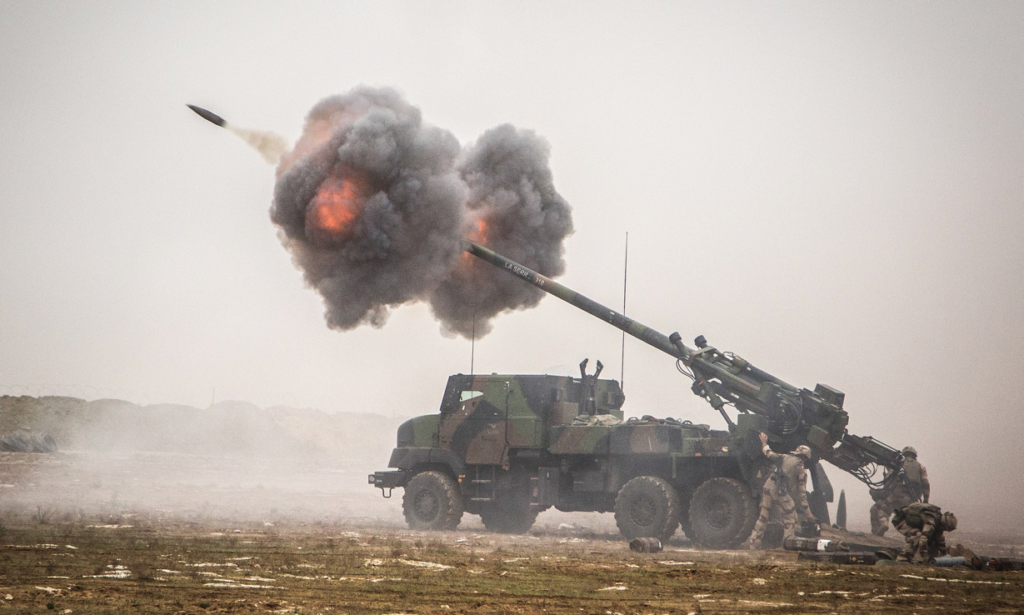
“We need to coordinate closely with Ukraine on the needs that there are on the ground.” As with most things in life, it’s never quite as simple as it sounds. “We should in parallel start producing and upgrading the weapons production. Where the weapons are needed now is in Ukraine. Everybody needs to understand that. And we, Europeans, who are closest, we need to do more and orient ourselves to the deliveries of the United States and Britain – they have delivered most.
And of course our partners in Central and Eastern Europe have done a tremendous job but Germany, France, Italy, Spain – major western countries inside the EU – they need to do definitely more and also not argue about their own defensibility,” the MEP added, responding to concerns that have been expressed about Western military powers being left with severely depleted weapons stocks. His answer is simple: “If Western powers deliver weapons to Ukraine, and Ukraine uses them to reduce Russian military potential, this automatically reduces the threat Russia poses to Europe,” he has pointed out. “If Russians have less to threaten us, it’s good for us, and for that purpose, we should deliver our available weapons to Ukraine to shorten the war, to push the Russians to their own borders, and then to make a rethinking in Moscow possible,” Gahler said. He is not the only German politician to call upon his country to supply more battle tanks to Ukrainian defenders. They are of superior quality to the type currently being fielded by the Russians, by and large.
Gahler would like to see Ukraine inside the European Union, although that might be difficult in the middle of a war. “Ukraine should work on its European integration and make itself so attractive that the EU cannot resist giving it membership,” he said. “Ukraine is like a bride who wants to be married, but the EU is still a bit hesitant.” Is it an understandable hesitancy at the moment, of course. It goes without saying that Russia dislikes Gahler and targets him for surveillance, but he’s not alone. “He is one of ten Europeans, including five MEPs, blacklisted by the Chinese authorities in retaliation for the sanctions agreed by the European Union for human rights violations in the Xinjiang region.”

He has also upset the Iranian authorities, you will not be surprised to learn, by condemning the killing of Masha Amini in Iran and the brutal suppression of any form of protest. Gahler has called for a “transparent” investigation into her killing, which he’s unlikely to get. The Iranian (supposedly) religious authorities are determined to retain control and to ensure that it’s invariably men who’re in charge, not women. “It is high time that the old men stop preaching to young women on how to dress and live”, Gahler said in his capacity as EPP Group Spokesperson on Foreign Affairs. I found it unnerving when I was among the Mujahideen in Afghanistan to see how a man would emerge first and alone from a family dwelling, with one or more women, fully veiled, of course, following on in single file behind. What makes some men consider themselves so superior to women that they can ignore their needs and concerns? It’s complete nonsense; I’d like to see how these brave, bullying men with their fierce beards would cope with giving birth. I wonder how brave they’d be then?
As for the immediate future, Gahler wants to see Germany deliver 200 Leopard tanks to the Ukrainian forces to give them battlefield superiority. Russia’s T-14 Armata tanks are better than the previous generation and certainly tougher and better-built, but probably still not up to the standard of the Leopard 2A7. However, its ammunition may not have the penetrative power offered by the Armata because Germany refuses to use depleted uranium, sticking with tungsten instead. A depleted uranium sabot round like the U.S. Army’s M829A3 would be more effective, but it would be a step too far for Germany. But a number of well-informed MEPs, including Michael Gahler, believe Ukraine can emerge the victor. Despite continuing Western scepticism, Ukraine can win and it can defeat Russia in its war of aggression, write MEPs Viola von Cramon-Taubadel Nicola Beer and Michael Gahler, defeating the blood-soaked ambitions of Putin and his ilk, even as they target Ukraine’s power and water supplies, inflicting black-outs on the suffering country.
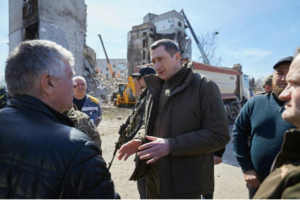
At the time of writing, Ukrainian government minister Oleksii Chernyshov claimed that 408 sites around the country had been struck, including 45 energy facilities. Among them are thermal energy plants that generate steam for heating homes and businesses. He has also targeted utility networks that have left parts of the country without access to drinking water. If Putin thinks he can persuade the Ukrainian people that they’d be better off under his rule, he seems to be going a very strange and self-defeating way about it. When the Soviets of old sang of “raise the scarlet banner high” it was in a very different world, when the red in the flag came from blood (“Their life blood soaked its every fold”). The song is about maintaining the struggle in the face of brutal violence and threats. “Though cowards flinch and traitors sneer,” run the words, “we’ll keep the Red Flag flying here.” It was all about the people – the ordinary people – standing up to their brutal overlords. In this modern age, it means standing up to the unfeeling brutality of a single megalomaniac. But the people (including Michael Gahler, of course) can still win.
Robin.Crow@europe-diplomatic.eu

